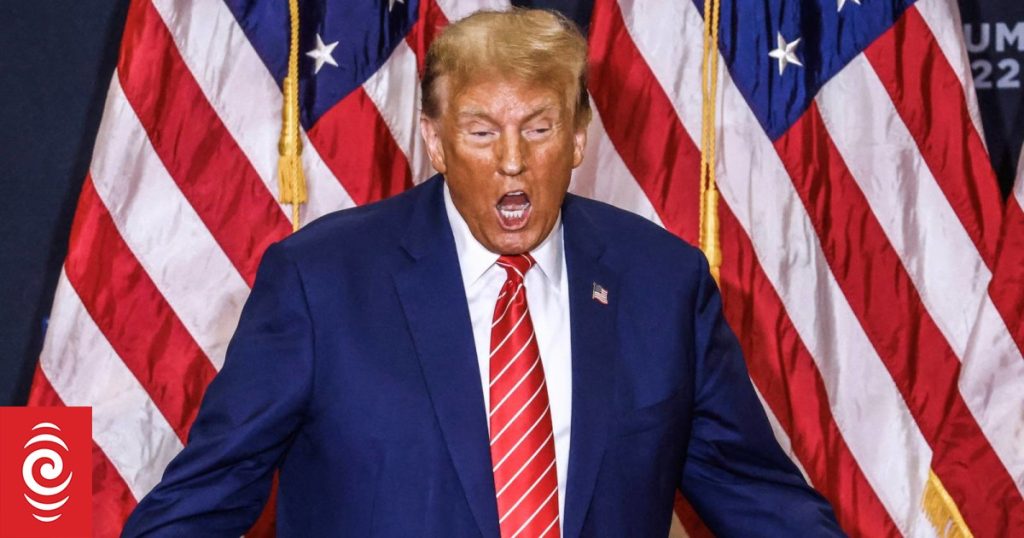Trump picks a fight with Detroit
3 min read
Trump has a history of insulting urban centers around the country, including in states he needs to win to return to the White House. Photo: TANNEN MAURY / AFP

Trump has a history of insulting urban centers around the country, including in states he needs to win to return to the White House. Photo: TANNEN MAURY / AFP
Former President Donald Trump made headlines on Thursday with comments aimed at Detroit, warning that the country could face dire consequences if Vice President Kamala Harris were to be elected. Speaking at the Detroit Economic Club, Trump said, “Our whole country will end up being like Detroit if (Harris is) your president. You’re going to have a mess on your hands.”
Trump’s remarks included a critique of Harris, claiming she had “destroyed” San Francisco, and asserted, “We’re not going to let her do that to this country.” This type of rhetoric is not new for Trump, who has a history of disparaging urban areas, especially those in states pivotal for his electoral strategy.
In his speech, Trump drew a stark comparison between Detroit and developing nations, accusing China of taking advantage of its status in international trade. “We’re a developing nation too. Just take a look at Detroit,” he remarked, suggesting the city is in a state of decline that rivals that of certain regions in China.
Despite Trump’s characterization, Detroit has shown signs of resilience. The city, which filed for bankruptcy in 2013, has made strides in economic recovery and revitalization. Recently, city officials announced that Detroit experienced its first population growth since 1957 between July 2022 and July 2023. On the day of Trump’s speech, the city was bustling with energy, as thousands gathered for a playoff baseball game and the Detroit Red Wings’ season opener.
Trump’s history of disparaging comments about urban centers continues to raise eyebrows, especially in crucial battleground states. Earlier this year, he stirred controversy by labeling Milwaukee, Wisconsin, as “horrible” in the context of crime and elections. Although he later reassured Wisconsin voters of his affection for the city, his comments have not gone unnoticed.
Harris responded to Trump’s latest jibe, emphasizing his pattern of criticizing American cities. “My opponent, Donald Trump, yet again, has trashed another great American city when he was in Detroit,” she said, indicating that such comments highlight his unsuitability for the presidency.
During his speech, Trump expressed a desire for the “triumph of the American auto industry” to be a significant part of his legacy. He promised a “rebirth” of Detroit, outlining plans to support the U.S. auto sector, including making interest on car loans fully tax-deductible. “By the end of my term, the entire world will be talking about the Michigan miracle and the stunning rebirth of Detroit,” he asserted.
Despite his claims, the reality of Detroit’s situation is more complex. While the city has faced challenges, local leaders emphasize the ongoing improvements and growth. Detroit Mayor Mike Duggan defended the city’s progress, highlighting recent successes like hosting the NFL Draft and a notable decrease in violent crime. “Lots of cities should be like Detroit. And we did it all without Trump’s help,” Duggan stated.
In response to Trump’s comments, Michigan Democratic Party Chair Lavora Barnes criticized him for consistently targeting cities with significant populations of hardworking Black residents. “Whatever Donald thinks, we’re proud to be a city that bounces back, no matter what gets thrown at us,” she said, indicating that Michigan’s role as a battleground state will be crucial in the upcoming election.
A spokesperson for Trump’s campaign in Michigan highlighted the city’s historical significance in the auto industry, claiming that Detroit has suffered from policies associated with Harris that led to the outsourcing of manufacturing jobs. “As President Trump emphasized in his speech, his policies will usher in a new era of economic success and stability for Detroit,” stated Victoria LaCivita, Trump’s Michigan Communications Director.
Trump’s remarks come as he seeks to strengthen his foothold in urban areas traditionally aligned with Democrats. As the election approaches, the responses from local leaders and residents demonstrate a commitment to the city’s future, countering the narrative put forth by the former president. With both Trump and Vice President Harris campaigning actively, Detroit remains a focal point in the broader political landscape as the nation heads toward another contentious election.
WhatsApp us